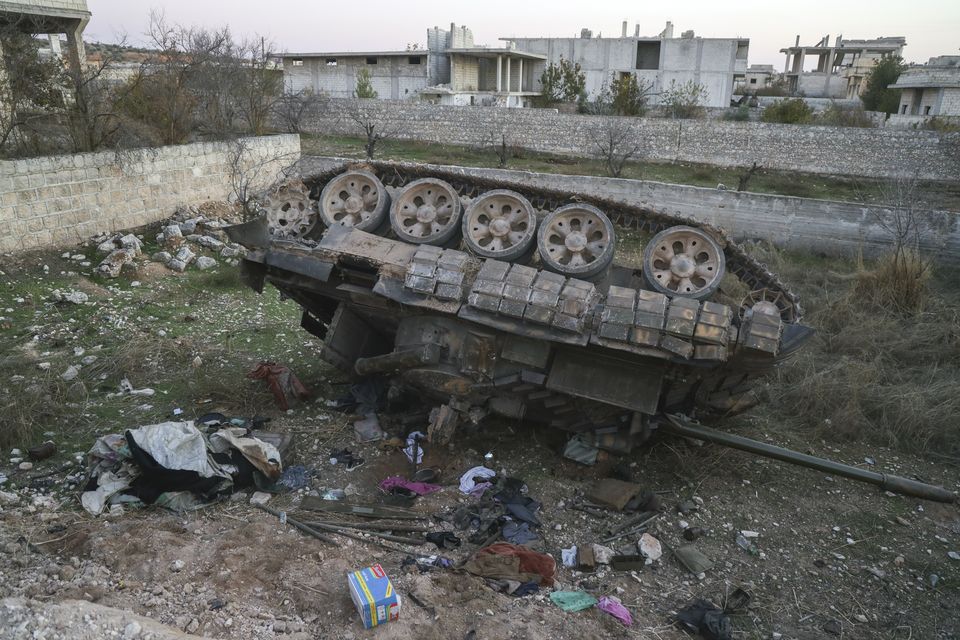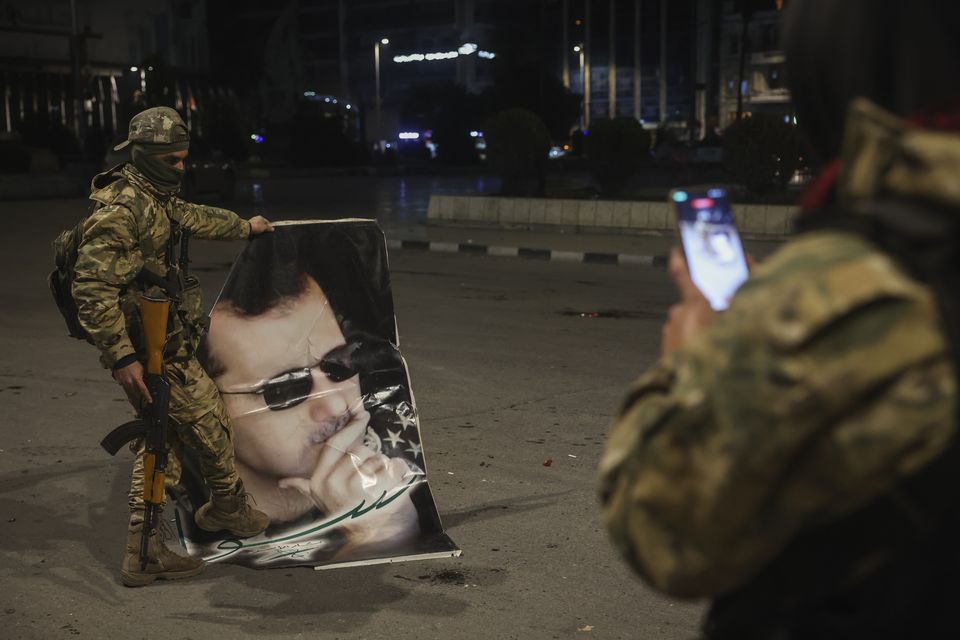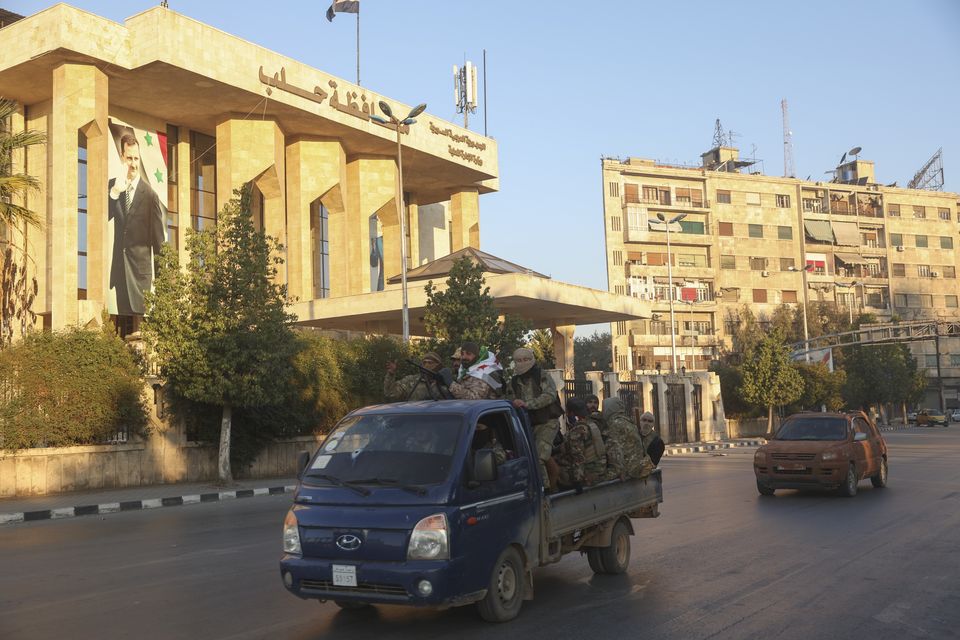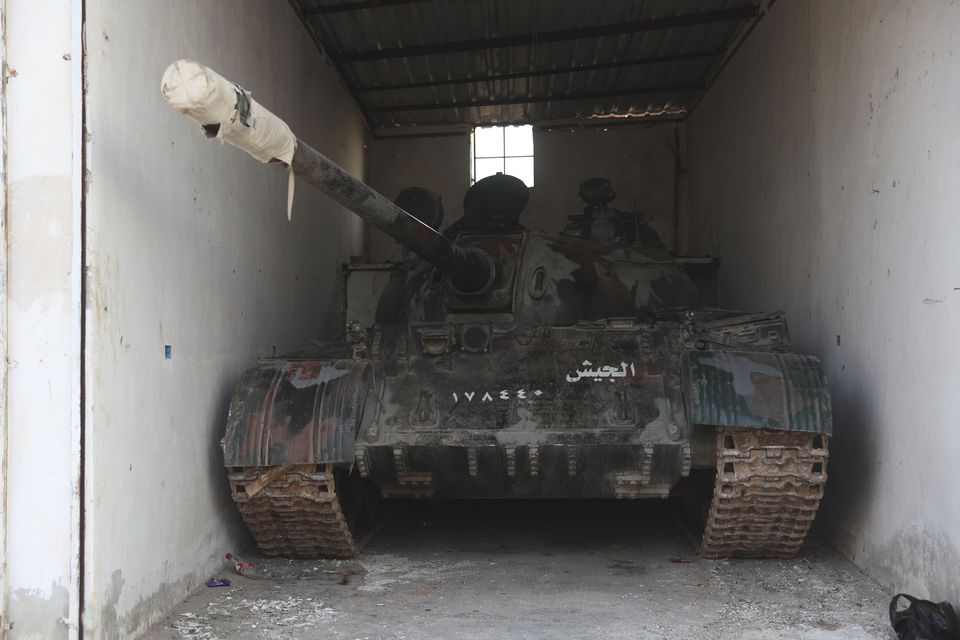Thousands of Syrian insurgents took over most of Aleppo on Saturday, establishing positions in the country’s largest city and controlling its airport before expanding their shock offensive to a nearby province.
They faced little to no resistance from government troops, according to fighters and activists.
A war monitor, the Syrian Observatory for Human Rights, said the insurgents led by Hayat Tahrir al-Sham seized control of Aleppo International airport, the first international airport to be controlled by insurgents.
The fighters claimed they seized the airport and posted pictures from there.
A Syrian army armoured vehicle sits upside-down in the village of Hass, near Aleppo on November 30 (AP Photo/Omar Albam)
Thousands of fighters also moved on, facing almost no opposition from government forces, to seize towns and villages in northern Hama, a province where they had a presence before being expelled by government troops in 2016. They claimed on Saturday evening to have entered the city of Hama.
The swift and surprise offensive is a huge embarrassment for Syria’s president, Bashar Assad, and raises questions about his armed forces’ preparedness.
The insurgent offensive launched from their stronghold in the country’s north west appeared to have been planned for years.
It also comes at a time when Mr Assad’s allies were preoccupied with their own conflicts.
A Syrian opposition fighter takes a picture of a comrade stepping on a portrait of Syrian president Bashar Assad in Aleppo (AP Photo/Ghaith Alsayed)
In his first public comments since the start of the offensive, released by the state news agency on Saturday evening, Mr Assad said Syria will continue to “defend its stability and territorial integrity against terrorists and their supporters”.
He added that Syria is able to defeat them no matter how much their attacks intensify.
Turkey, a main backer of Syrian opposition groups, said its diplomatic efforts had failed to stop government attacks on opposition-held areas in recent weeks, which were in violation of a de-escalation agreement sponsored by Russia, Iran and Ankara.
Turkish security officials said a limited offensive by the rebels was planned to stop government attacks and allow civilians to return, but the offensive expanded as Syrian government forces began to retreat from their positions.
Opposition fighters conceal a tank inside a garage near Aleppo (AP Photo/Ghaith Alsayed)
The insurgents, led by the Salafi jihadi group, Hayat Tahrir al-Sham, and including Turkey-backed fighters, launched their shock offensive on Wednesday.
They first staged a two-pronged attack in Aleppo and the Idlib countryside, entering Aleppo two days later and securing a strategic town that lies on the highway that links Syria’s largest city to the capital and the coast.
By Saturday evening, they had seized at least four towns in the central Hama province and claimed to have entered the provincial capital.
The insurgents staged an attempt to reclaim areas they controlled in Hama in 2017 but failed.
Opposition forces taking control of areas outside Aleppo (AP Photo/Ghaith Alsayed)
Syria’s armed forces said in a statement on Saturday that to absorb the large attack on Aleppo and save lives, it redeployed troops and equipment and was preparing a counter-attack.
The statement acknowledged that insurgents entered large parts of the city but said they have not established bases or checkpoints.
Later on Saturday, the armed forces sought to dispel what it said were lies in reference to reports about its forces retreating or defecting, saying the general command was carrying out its duties in “combatting terrorist organisations”.
The return of the insurgents to Aleppo was their first since 2016, following a gruelling military campaign in which Mr Assad’s forces were backed by Russia, Iran and its allied groups.
Aleppo residents reported hearing clashes and gunfire but most stayed indoors. Some fled the fighting.
The Syrian Kurdish-led administration in the country’s east said nearly 3,000 people, most of them students, had arrived in their region after fleeing the fighting in Aleppo, which has a sizeable Kurdish population.
State media reported that a number of “terrorists”, including sleeper cells, infiltrated parts of the city. Government troops chased them and arrested a number who posed for pictures near city landmarks, they said.



